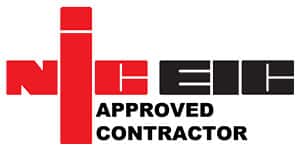Electrical Installation Condition Reports
Safety regulations and electrical compliance are non-negotiable, and businesses face the daunting task of navigating the complex web of electrical safety standards. Consequently, regular checks like Electrical Installation Condition Reports (EICRs) are not just a recommended practice, but a legal requirement.
SCV Electrical provides a comprehensive and efficient EICR service that ensures compliance, safety, and reliability for our clients. With a focus on local businesses, our solution saves both time and money by identifying electrical issues before they become problematic.
Choose SCV Electrical
SCV Electrical offers a comprehensive EICR service designed to fit seamlessly into your business operations. With expertise from years in the industry, SCV stands at the forefront of electrical safety, ensuring your peace of mind and legal compliance.
We offer:
- Thorough Inspections: Our certified electricians provide detailed reports on the condition of your electrical installations, identifying any potential hazards.
- Tailored Service: We understand that each business is unique, and so are its electrical needs. SCV’s services are custom-tailored to address the specific requirements of your company.
- Expert Consultation: Beyond the report, we offer strategic, actionable advice to rectify any issues found, helping you maintain a safe and productive working environment.
- Timely Reminders: We keep track of your EICR deadlines to ensure you never miss an assessment, simplifying compliance management.
Our EICR reports are fully certified and backed by the NICEIC, ensuring the highest standards for our clients and complete compliance for both residential and commercial premises.
The Purpose of an EICR
Understanding the condition and performance of your electrical systems is vital to ensuring the safety of your workspace. Through an Electrical Installation Condition Report (EICR), you gain valuable insights into the integrity of your electrical installations.
These reports provide an in-depth analysis of the functionality, safety, and potential risks associated with your electrics. Here are some crucial purposes of an EICR:
- Identify defects: An EICR helps you identify any defective electrics within your workspace, allowing you to rectify them before they can cause significant damage.
- Highlight hazards: It plays a pivotal role in highlighting potential shock and fire hazards, giving you an opportunity to make your workspace safer.
- Identify immediate dangers: An EICR can bring to your attention any imminently dangerous conditions in your electrical systems and the work that needs to be done to resolve this.
- Identify other hazards: It aids in discovering any lack of earthing or bonding, which can prevent potential incidents.
- Locate overloaded electrics: The report also helps you locate any of your electrical circuits or equipment that are overloaded, ensuring you avoid potentially damaging situations.
About SCV Electrical
SCV Electrical are reliable and trustworthy electrical contractors based in East London that serve all London boroughs and offer a wide range of domestic and commercial electrical services.
Contact Us Today
If you need to book your next EICR then please contact us today for more information and to arrange your next electrical inspection.

